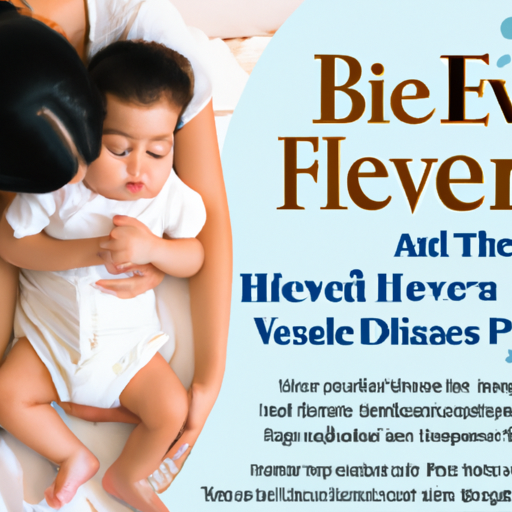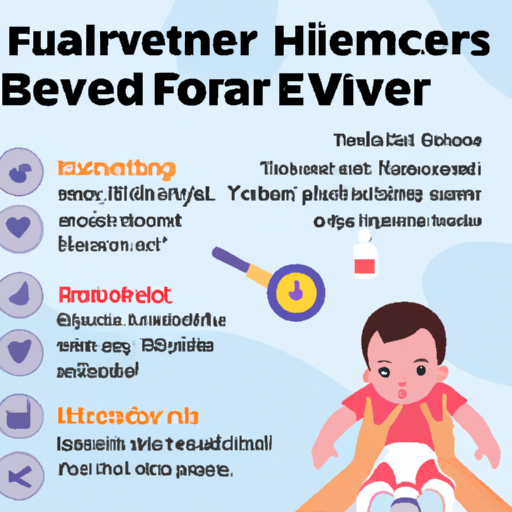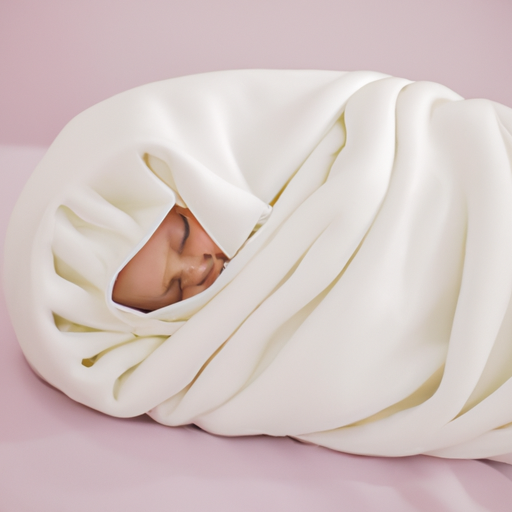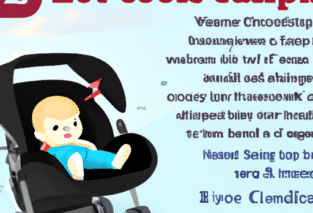It’s a common concern among new parents, and understandably so. A fever in a baby can be a sign that something is not quite right. But before you start to panic, take a deep breath and remember that there are steps you can take to help your little one feel better. In this article, we’ll discuss what you should do if your baby has a fever, including when to call the doctor and how to provide comfort while they recover. So, don’t worry, you’re in the right place to find some answers.
If you’re unsure about what to do when your baby has a fever, you’ve come to the right place. In this article, you’ll learn about the common causes of fever in babies, how to determine if it’s serious, and most importantly, what steps you can take to help your baby feel better. Understanding how to handle your baby’s fever can bring you peace of mind and ensure that you’re providing the best care possible. So, keep reading to become more informed about what to do if your baby has a fever.
Understanding Fever in Babies
Fever can be a cause for concern, especially when it comes to our little ones. As a parent, it is important to understand what a fever is, what causes it, and when to be concerned. By having this knowledge, you can take appropriate action and ensure the well-being of your baby.
Normal body temperature in babies
Before we dive into the world of fevers, let’s first establish what is considered a normal body temperature for babies. The average body temperature for a healthy baby is around 98.6°F (37°C). However, it is important to note that normal body temperature can vary slightly from baby to baby.
Causes of fever in babies
Fevers in babies are often a sign that the body is fighting off an infection. Common causes of fever in babies include viral or bacterial infections, such as the common cold, flu, or ear infections. Teething can also cause a low-grade fever in babies. In some cases, vaccines or immunizations can also lead to a mild fever as the body builds immunity.
When to be concerned about a fever
While a fever itself is not always cause for alarm, there are certain signs and symptoms that warrant medical attention. If your baby is under three months old and has a rectal temperature of 100.4°F (38°C) or higher, it is important to seek medical attention immediately. For babies over three months old, a fever of 102°F (38.9°C) or higher should be a cause for concern. Additionally, if your baby is exhibiting other symptoms such as rash, difficulty breathing, seizures, or persistent vomiting, it is important to seek medical attention promptly.
Taking Your Baby’s Temperature
Taking your baby’s temperature accurately is crucial in determining their body temperature and assessing their overall health. There are several methods you can use to measure your baby’s temperature:
Different methods to measure temperature
- Rectal thermometer: This is the most accurate method for taking a baby’s temperature, as it provides a core body temperature reading. However, it may be uncomfortable for both you and your baby.
- Oral thermometer: This method is best suited for older babies and toddlers who can hold the thermometer in their mouths without biting on it.
- Ear thermometer: This method is quick and easy, but it may not always be accurate, especially in younger babies with smaller ear canals.
- Forehead thermometer: This method provides a non-invasive way to measure temperature, but it may not always be as accurate as other methods.
Choosing the right thermometer
When choosing a thermometer for your baby, it is important to consider factors such as accuracy, ease of use, and age-appropriateness. It is also a good idea to have a backup thermometer on hand, especially if you rely on a specific method for temperature measurement.
Tips for accurate temperature measurement
To ensure accurate temperature measurement, it is important to follow these tips:
- Make sure the thermometer is clean and in good working condition.
- Choose the appropriate method for your baby’s age and developmental stage.
- Follow the manufacturer’s instructions for proper use.
- Take multiple readings to ensure consistency.
- Take note of the time and date of each temperature reading for future reference.

When should I Seek Medical Attention?
While it is normal to feel concerned when your baby has a fever, there are certain signs and symptoms that indicate the need for medical attention. Here are some indicators that you should reach out to your healthcare provider:
Signs and symptoms that warrant medical attention
- Rectal temperature of 100.4°F (38°C) or higher in babies under three months old.
- Fever of 102°F (38.9°C) or higher in babies over three months old.
- Excessive irritability or inconsolable crying.
- Difficulty breathing or rapid breathing.
- Signs of dehydration, such as decreased urine output or dry mouth.
- Rash or purplish spots on the skin.
- Stiff neck or difficulty moving limbs.
- Seizures or convulsions.
- Persistent vomiting or inability to keep fluids down.
Calling the doctor or seeking emergency care
If your baby exhibits any of the above signs and symptoms, it is important to contact your healthcare provider immediately. They will be able to provide guidance on whether your baby needs to be seen in-person or if further medical attention is required. In some cases, such as difficulty breathing or seizures, it may be necessary to seek emergency care.
What to expect during a doctor visit
When you take your baby to the doctor for a fever, they will likely perform a physical examination and may order additional tests, such as blood work or a urine analysis, to identify the underlying cause of the fever. Communication with your healthcare provider is key, so be prepared to discuss your baby’s symptoms, medical history, and any recent changes or exposures that may be relevant.
Managing Fever at Home
While waiting for medical guidance or if your baby’s fever is not severe, you can take steps to keep them comfortable and monitor their temperature at home.
Keeping your baby comfortable
- Dress your baby in lightweight, breathable clothing.
- Use a light blanket or sheet for bedding.
- Keep the room temperature cool and comfortable.
- Offer plenty of fluids to prevent dehydration.
- Encourage rest and sleep as much as possible.
Offering fluids and maintaining hydration
Fevers can cause increased fluid loss through sweating and increased respiratory rate. It is important to offer your baby plenty of fluids to prevent dehydration. If your baby is breastfeeding, continue to nurse on demand. For formula-fed babies, offer small amounts of formula frequently. If your baby is over six months old and has started solids, offer water or diluted fruit juice. It is best to avoid sugary drinks or excessive amounts of juice.
Using fever-reducing medications responsibly
Fever-reducing medications, such as acetaminophen or ibuprofen, can be used to help alleviate discomfort and reduce fever. However, it is important to use these medications responsibly and follow the dosing instructions provided by your healthcare provider or the medication packaging. Never give aspirin to a child without specific instructions from a healthcare professional, as it can lead to a serious condition called Reye’s syndrome.

When Not to Use Fever-Reducing Medications
While fever-reducing medications can help alleviate discomfort, there are times when their use may not be necessary or recommended.
Times when medication is unnecessary
- If your baby’s fever is mild and they are otherwise behaving normally.
- If your baby is older than three months and their fever is not causing significant distress.
- If your baby’s fever is due to teething or a mild viral infection that is not causing severe symptoms.
Potential risks and side effects of fever-reducing drugs
Although fever-reducing medications are generally safe when used properly, there can be potential risks and side effects. It is important to be aware of these and consult with your healthcare provider if you have any concerns. Some potential risks and side effects include:
- Allergic reactions.
- Interaction with other medications your baby may be taking.
- Overdosing or giving the wrong dosage.
- Masking symptoms of a more serious underlying condition.
Natural Remedies for Fever
In addition to medications, there are also natural remedies that can help reduce fever in babies. It is important to note that while these remedies may provide some relief, they should not replace medical care or be used as a substitute for professional advice. Always consult with your healthcare provider before using any natural remedies.
Safe and effective home remedies for reducing fever
- Dress your baby in cool, lightweight clothing.
- Use a damp washcloth or sponge to gently cool your baby’s skin.
- Give your baby a lukewarm bath.
- Offer cool, clear fluids such as water, breast milk, or formula.
- Use a cool mist humidifier in the room to help keep the air moist.
When to consult a healthcare provider before using natural remedies
If your baby’s fever persists despite using natural remedies, or if their symptoms worsen or become concerning, it is important to consult with your healthcare provider. They will be able to provide guidance based on your baby’s specific situation and advise on the best course of action.
Preventing Fever in Babies
While it may not always be possible to prevent fevers in babies, there are practical steps you can take to minimize the risk. Here are some tips for preventing fever:
Practical tips for preventing fever
- Practice good hand hygiene by washing your hands frequently and encouraging others to do so as well.
- Avoid close contact with individuals who are sick, especially those with respiratory infections.
- Ensure your baby is up to date on their immunizations.
- Maintain a clean and hygienic environment by regularly disinfecting surfaces and toys.
Importance of vaccination
Vaccinations play a crucial role in preventing serious illnesses that can cause high fevers in babies. By ensuring your baby is up to date on their immunizations, you can help protect them from vaccine-preventable diseases and reduce the likelihood of fever-related complications.
Maintaining a clean and hygienic environment
Babies are more susceptible to infections, so it is important to maintain a clean and hygienic environment. Regularly clean and disinfect surfaces, toys, and bottles to minimize the spread of germs. Additionally, encourage family members and visitors to wash their hands before handling your baby.
Fever and Other Illnesses
Fever can be a symptom of various illnesses or infections that commonly affect babies. Understanding the relationship between fever and specific diseases can help you identify potential causes and seek appropriate medical care.
Common illnesses associated with fever in babies
Some common illnesses that may cause fever in babies include:
- Common cold: Often accompanied by runny nose, cough, and congestion.
- Flu: Characterized by high fever, body aches, and fatigue.
- Ear infection: May cause ear pain, fluid drainage, and irritability.
- Urinary tract infection (UTI): May cause frequent urination, pain during urination, and persistent fever.
- Respiratory infections: such as bronchitis or pneumonia.
Understanding the relationship between fever and specific diseases
Fever is the body’s natural response to infection or inflammation. The presence of a fever indicates that the body is trying to fight off an illness. While a fever can be uncomfortable for your baby, it can also serve as a helpful indicator for healthcare providers in diagnosing the underlying cause of their illness.
How to Monitor Your Baby’s Fever
Monitoring your baby’s fever is an important part of managing their illness and ensuring their well-being. By keeping a record of temperature readings and recognizing patterns or changes in fever, you can better understand your baby’s condition and know when to seek further medical advice.
Keeping a record of temperature readings
Keep track of your baby’s temperature by recording the readings in a notebook or using a temperature tracking app. Note the time, date, and method of temperature measurement. This record can help you identify any changes or patterns in your baby’s fever and provide valuable information to share with your healthcare provider.
Recognizing patterns and changes in fever
Pay attention to the patterns and changes in your baby’s fever. Is the fever consistently high, or does it fluctuate throughout the day? Are there any specific triggers or factors that seem to worsen or alleviate the fever? These observations can provide valuable insights for your healthcare provider and help guide their assessment and treatment.
Knowing when to seek further medical advice
If your baby’s fever persists for more than a few days, worsens, or is accompanied by concerning symptoms, it is important to seek further medical advice. Your healthcare provider will be able to assess your baby’s condition and provide appropriate recommendations or further testing if necessary.
Conclusion
In conclusion, having a baby with a fever can be a worrisome experience for any parent. However, by understanding fever in babies, taking their temperature accurately, knowing when to seek medical attention, managing fever at home responsibly, and preventing fevers whenever possible, you can navigate this common childhood ailment with confidence. Remember, always trust your instincts as a parent and consult with your healthcare provider if you have any concerns. Taking appropriate action when your baby has a fever ensures their well-being, and informing yourself about fever management empowers you as a parent.





